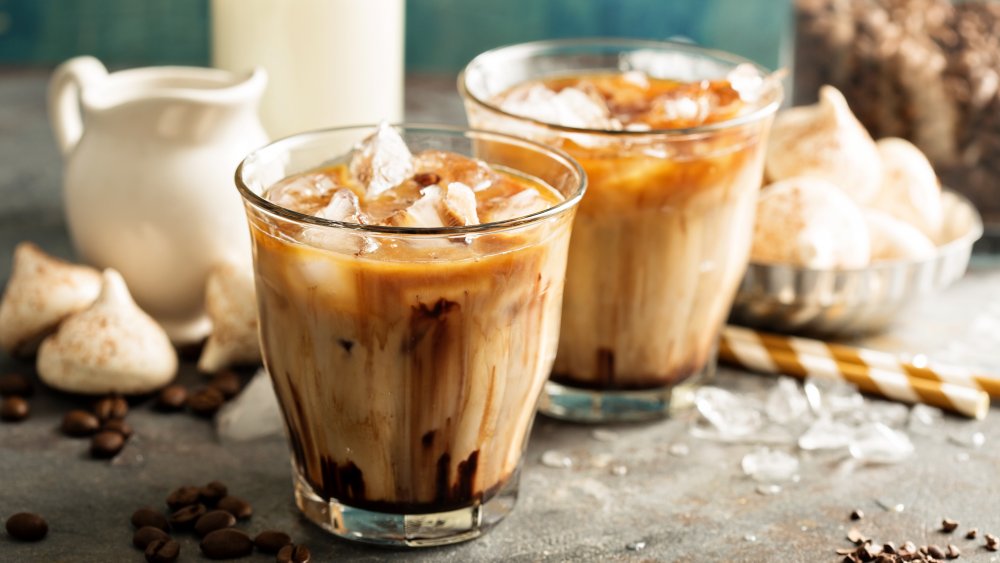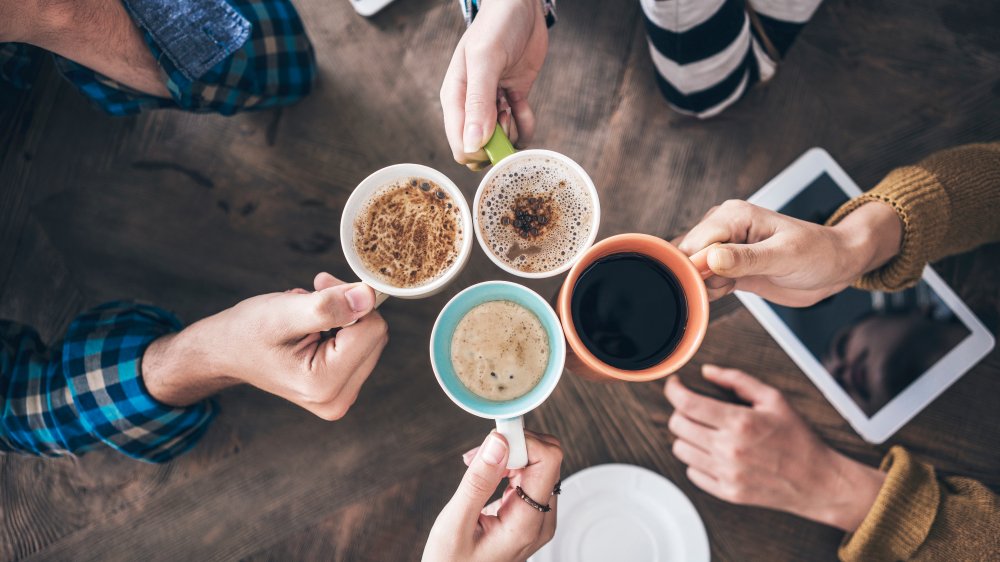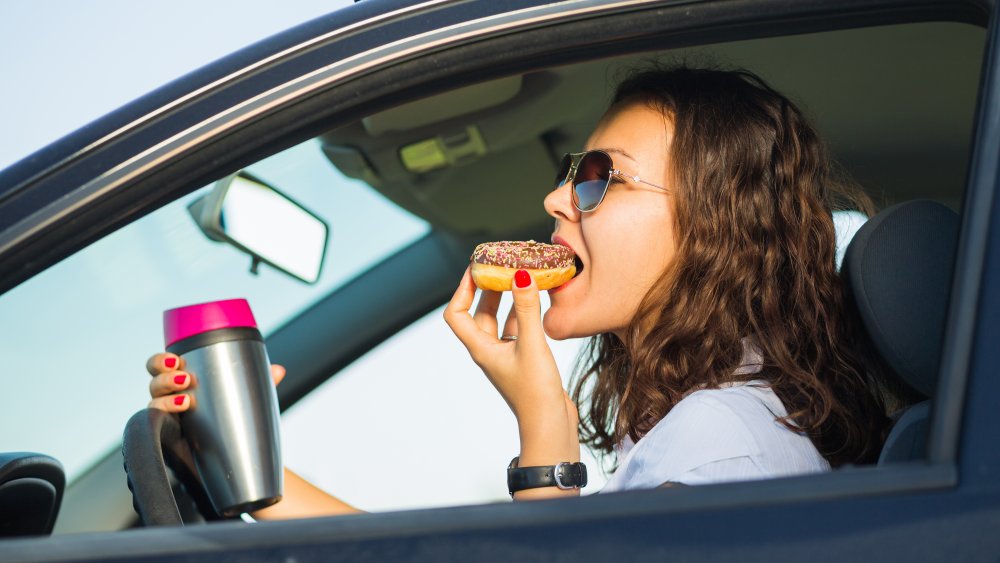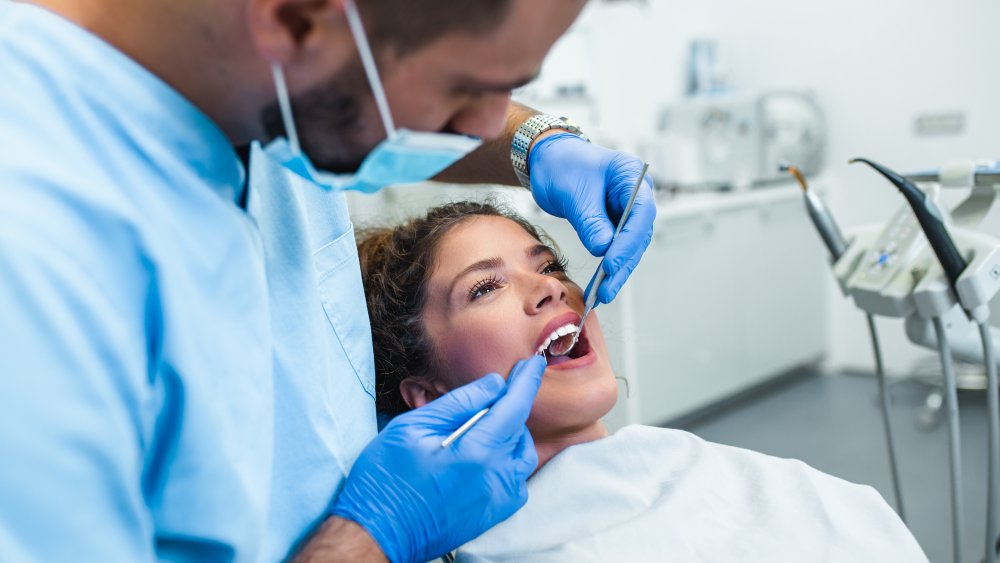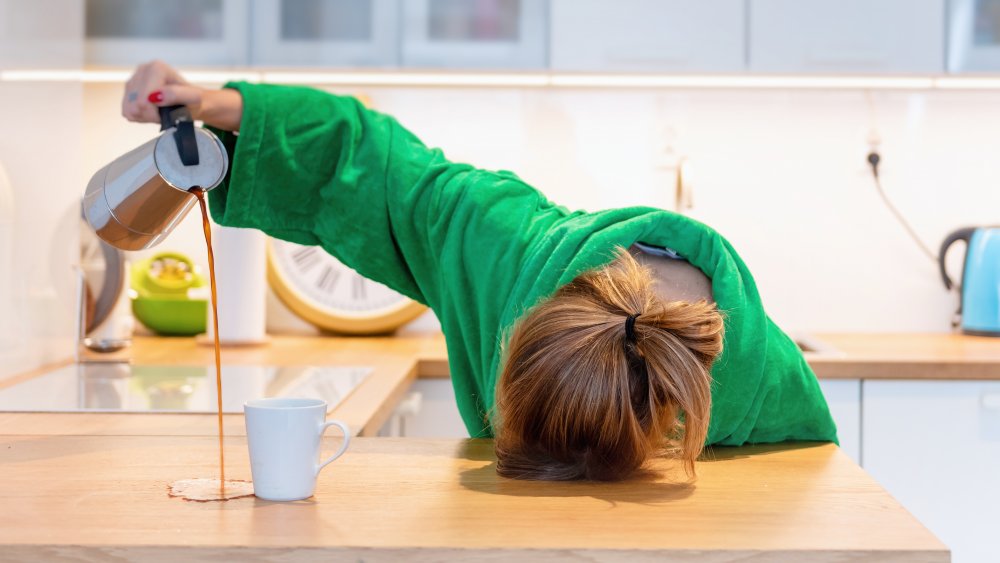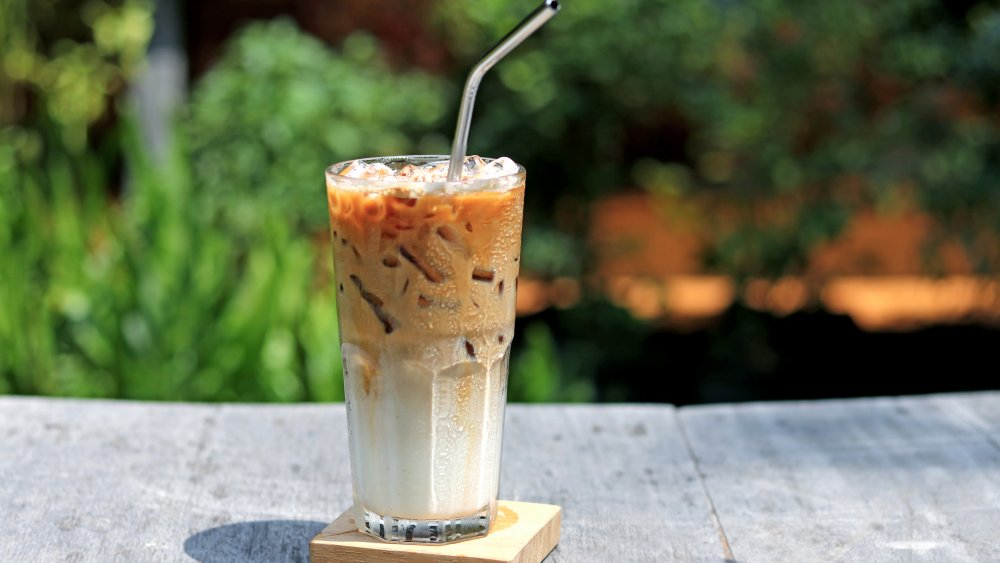When You Add Flavored Syrups To Your Coffee Every Day, This Is What Happens To Your Body
While there are major health benefits to regularly drinking coffee, what if you add flavored syrups to your coffee every day? According to a 2015 study published in Circulation, for example, the consumption of coffee is actually linked to a reduction in the risk of death. Why? Well, a wealth of research suggests that coffee drinkers may have reduced risks of cardiovascular disease (including heart attacks, heart failure, and strokes), type 2 diabetes, Parkinson's disease, uterine and liver cancer, cirrhosis, and gout, according to Harvard Medical School.
But while drinking coffee alone may have its health benefits, pouring additives like flavored syrups into your coffee can take a toll on your body. Sure, flavored syrups like vanilla, hazelnut, caramel, and pumpkin spice may taste delicious and make your morning cup of joe that much more enjoyable, but what happens to your body when you add flavored syrups to your coffee every day?
You'll be consuming a lot of sugar if you add flavored syrups to your coffee every day
Some flavored syrups contain a hefty amount of sugar that your body doesn't need.
For example, one fluid ounce (which equates to about four pumps) of many Torani brand flavored syrups contains 19 grams of sugar, according to Prevention. The Daily Meal reported that a grande latte at Starbucks gets four pumps of syrup, so it's easy to fill up on a fluid ounce of sugar. Meanwhile, Monin's vanilla syrup contains 23 grams of sugar per fluid ounce, and DaVinci's Gourmet Classic caramel syrup contains 15 grams of sugar per fluid ounce.
According to Healthline, the consumption of too much sugar is associated with both weight gain and various diseases. So what is a safe amount of sugar to consume in a day? According to the American Heart Association, the maximum amount of added sugars women should consume in a day is 25 grams, and the maximum amount of added sugars men should consume in a day is 36 grams. That means that just one cup of coffee with flavored syrups may make up the bulk of all the added sugars you should consume in the entire day. Makes you think twice about adding flavored syrups to your coffee every day, huh?
If you add flavored syrups to your coffee every day, you may crave other sugary sweets more
If you're adding flavored syrups to your coffee ever day, you may be consuming high amounts of sugar, which may actually increase your cravings for other sugary sweets. That's because the more sugar you consume, the more sugar you desire, according to WebMD. It works like this: Sugar powers each brain cell, which then perceives sugar as a reward; eating a lot of sugar, therefore, reinforces that reward, which can turn your sugar habit into a vicious cycle.
Even if your choice of flavored syrup is labeled "sugar-free," however, it can still increase your desire for sweets, according to Spoon University. That's because you may assume you can overindulge on other unhealthy foods just because you've opted for a sugar-free option in your choice of coffee syrup. Starbuck's sugar-free flavored coffee syrups, for example, may boost consumers' desires for sweets, Spoon University reported. Perhaps for some people, getting a sugar-free syrup in their coffee makes them feel better about snagging an unhealthy snack with their latte.
When you add flavored syrups to your coffee every day, you may be ingesting a high amount of propylene glycol
When you add flavored syrups to your coffee every day, you may be consuming the chemical solvent propylene glycol that attaches the flavors of the syrup to the beans, according to Spoon University. Propylene glycol, which is syrupy in consistency, has no color or odor and functions as a "synthetic food additive that belongs to the same chemical group as alcohol," according to Healthline. It's commonly used as an anti-caking agent to help prevent ingredients in food from sticking together (for example, grated cheese), as an antioxidant to prolong the shelf life of foods, and as a moisture preserver, stabilizer, thickener, texturizer, and emulsifier.
However, propylene glycol "comes from the same family of glycols that are present in your car's anti-freeze," according to Flavor Bean. Rest assured that the United States and European food authorities have indeed declared propylene glycol as "generally safe for use in foods," according to Healthline. But while this is generally safe to consume in small amounts, large doses could potentially be toxic, Spoon University reported.
The World Health Organization suggests ingesting no more than 11.4 mg of propylene glycol per pound of body weight per day (via Healthline).
Some ingredients in flavored syrups you add to your coffee can affect DNA cells
It's always important to check the ingredients in every food item that you consume because knowledge is power; knowing what you're putting into your body can help you to stay on top of your health. While it's common knowledge that too much sugar isn't great for you, however, you may not necessarily be aware of some other ingredients that can seriously impact your health.
For example, some flavored syrups you can add to your coffee may contain certain ingredients that can actually affect your DNA cells, according to Spoon University. These include preservatives such as sodium benzoate, which, in large doses, can be toxic, according to a study in Biotechnology & Biotechnological Equipment and a study published in BioMed Research International. Potassium sorbate is another preservative that can affect DNA cells, according to a study published in Cytotechnology and another study published in Food and Chemical Toxicology.
It's important to be mindful of the preservatives that your addition of flavored syrups in your coffee every day may have.
If you add flavored syrups to your coffee every day, you could accelerate cognitive decline
If you consume flavored syrups in your coffee that contain high amounts of sugar, such as Monin's French vanilla syrup (23 grams of sugar per fluid ounce) or Monin's hazelnut syrup (21 grams of sugar per fluid ounce), they could take a toll on your body and your mind. That's because the consumption of high amounts of sugar has been linked to impaired memory and quicker cognitive decline, according to research from a study published in The New England Journal of Medicine, as reported by Healthline. A 2016 study published in Behavioural Brain Research suggested that high sugar consumption may cause inflammation of the brain.
Don't be too alarmed, however. A 2017 study in the journal Appetite found that you may actually reverse the sugar-induced memory damage by following a low-sugar diet. So, if you think you've been consuming too much sugar by adding flavored syrups to your coffee every day, you can help your health by cutting back.
Adding flavored syrups to your coffee every day may increase your carb intake
If your coffee is just straight ground beans and hot water, you don't really have to worry about carbs. But when you add milk or flavored syrups to your coffee, you introduce more carbs to your drink, according to Healthline. Take, for example, a latte with a 1:3 ratio of espresso to milk. This latte contains more carbs than a regular black coffee because it's mostly milk and, if you choose to add some flavor to it with a vanilla syrup, a single fluid ounce could add 24 grams of carbs, as noted by Healthline. A 16-ounce Caffè Mocha from Starbucks that's made with two percent milk and four pumps of Mocha Sauce, for example, contains 44 grams of carbs.
And it's important to be careful with refined carbs, which have been processed. Refined carbs are often found in syrups and are linked to a severely increased risk of diseases, such as obesity, heart disease, and type 2 diabetes, as reported by Healthline.
The added sugar in flavored syrups you put in your coffee could lead to weight gain
It's no secret that sugary foods aren't exactly ideal for your health. If sugar were good for you, we wouldn't all have to hide our sweet tooth guilty pleasures from ourselves (yes, we're referring to the chocolate stash in your desk). The unfortunate reality is that sugar that's found in many flavored syrups — like Torani brand flavored syrups, which contains 19 grams of sugar per fluid ounce, according to Prevention; Monin's vanilla syrup, which has 23 grams of sugar per fluid ounce, and DaVinci's Gourmet classic German chocolate cake syrup, which contains 18 grams of sugar per fluid ounce — can lead to weight gain, increased body fat, and chronic health conditions, according to Healthline.
Why can adding sugary flavored syrups to your coffee every day lead to weight gain? Simply put, yes. They contain many empty calories, increase blood sugar and hormone levels, and are often not as filling so you may eat more, as explained by Healthline. In fact, one review of 30 studies published in Obesity Facts found a link between sugar-sweetened beverages and obesity.
The added sugar in flavored syrups in your coffee may cause you to overeat
The added sugars in some flavored syrups — like DaVinci's caramel syrup (which contains 15 grams of sugar per fluid ounce) or DaVinci's Gourmet classic German chocolate cake syrup (which contains 18 grams of sugar per fluid ounce) — may cause you to overeat. According to Healthline, added sugar can have an impact on your hormones and brain activity, thereby increasing your hunger and lowering your "fullness signals," so you keep eating. In fact, one study published in Frontiers in Psychiatry found that the consumption of just ten ounces of a sugary drink actually led to lowered levels of the hormone GLP-1, which controls appetite, as well as an increased reaction to photographs of high-calorie foods.
In other words, when you consume sugar, you'll crave more sugar and you'll feel hungrier. So when you add sugary flavored syrups to your coffee, your sweet tooth may cause you to keep eating other treats.
The added sugar in flavored coffee syrups may lead to diabetes and heart disease
Sugar can have some serious effects on your health when you consume too much of it. As the saying goes, everything in moderation. For example, the added sugars in some flavored syrups may lead to health complications like diabetes and heart disease, according to Healthline.
Studies have shown that sugar-sweetened drinks like coffee are linked to diabetes, such as a study published in the Journal of Diabetes Investigation and a study published in the Nutrition & Diabetes journal, the latter of which found the association specifically in women. Another study, this one published in the Journal of the American Medical Association, suggested that the risk of dying from heart disease is more than doubled in people who consume 25 percent or more of their daily calories from added sugars (via Healthline).
So you may want to consider your sugar intake before you pump too much syrup into your coffee every day.
The added sugar in flavored syrups you put in your coffee may lead to poor dental health
Though there are sugar-free options, many flavored syrups for coffee do obtain many grams of sugar — like Torani brand flavored syrups that contain 19 grams of sugar per fluid ounce, according to Prevention. And too much sugar can lead to poor dental health, according to Healthline. This is because bacteria in your mouth "feed on sugar," and, when they do, they "release acid byproducts" that demineralize the teeth. In other words, too much sugar can lead to cavities.
One study published in ISRN Dentistry found that sugar and sugar substitutes can have an impact your dental health — and just how much sugar you consume plays a role, among other factors. "Whether this initial demineralization proceeds to clinically detectable caries [a chronic dental disease] or whether the lesion is remineralized by plaque minerals depends on a number of factors, of which the amount and frequency of further sugars consumption are of utmost importance," the researchers explained.
Therefore, if you're drinking sugary flavored syrups in your coffee every day, you may wind up with more cavities than you would otherwise.
Too much sugar from flavored syrups in your coffee can lead to skin problems
Ever eat a lot of candy and break out soon afterwards? You may just get the same results if you drink coffee with sugary flavored syrups every day. Many flavored coffee syrups contain a high amount sugar. Monin's vanilla syrup, for instance, has 23 grams of sugar per fluid ounce. So if you drink a lot of flavored syrups in your coffee — and if you drink them regularly — there's a chance that you'll develop acne or age your skin, according to Healthline. So, unfortunately for all of us, you can count anything with high amounts of sugar as one of the surprising things that cause acne.
Why? Well, sugary foods can lead to a spike in blood sugar and insulin levels. This, in turn, can boost your skin's androgen secretion and oil production, as well as cause inflammation, as noted by Healthline. All of these factors contribute to acne, according to a study published in the Journal of the American Academy of Dermatology. Likewise, when sugar and protein in your body react, compounds called advanced glycation end products form, and they may play a key role in skin aging, according to a study published in Dermato-endocrinology (via Healthline).
Too much sugar from flavored syrups in coffee can lead to depression
Adding flavored syrups to your coffee every day can make your coffee taste that much better, but many flavored syrups taste so great because they contain a lot of sugar. It's important to watch your sugar intake because too much sugary syrup in your coffee, especially when consumed every day, can contribute to depression, according to a study published in PLOS One. "Compared to nondrinkers, drinking coffee or tea without any sweetener was associated with a lower risk for depression, adding artificial sweeteners, but not sugar or honey, was associated with higher risks," the researchers reported.
So, while researchers found that coffee consumption may indeed lower the risk of depression, frequent consumption of sweetened beverages could actually increase older adults' risk for depression. So you may want to be mindful of how much or what kind of flavored syrup you use in your coffee, and pay attention to how it makes you feel.
Adding sugary flavored syrups to your coffee can have adverse effects and drain your energy
Why do you drink coffee? For most of us, it's because we want the energy kick. Many of us need a cup of coffee in the morning to jumpstart our days. Some of us can't even go throughout our days without several cups of coffee to keep us moving and grooving. But you should be mindful of adding flavored syrups to your coffee every day. If your flavored syrup of choice contains a lot of sugar, it can actually have adverse effects on your energy; it can drain you instead of pump you up, according to Healthline.
Because sugar intake, of course, affects your blood sugar, frequent changes in blood sugar can lead to ups and downs in energy, as one study published in Obesity (Silver Spring) found (via Healthline). Beyond that, some high-sugar foods can actually lead to an energy crash, according to another study published in the Journal of the American Dietetic Association. So, while you may feel a boost at first, you might be hit with exhaustion not far down the line.
Adding sugary flavored syrups to your coffee can increase your risk of kidney disease
Not all flavored syrups contain sugar. You do have the option to shop for and consume sugar-free flavored syrups for your coffee. If, however, you do choose to go with a flavored syrup that's high in sugar, you may want to be conscious of how that sugar can affect your risk of kidney disease, according to Healthline.
For example, Monin's salted caramel syrup has 24 grams of sugar per fluid ounce, and DaVinci's caramel syrup has 18 grams of sugar per fluid ounce. Pumping one of these flavored syrups — or another syrup like them — into your coffee every day can potentially take a toll on your kidneys. That's because the sugar can increase your blood sugar levels, which can damage the blood vessels in your kidneys, according to Healthline. One study published in Advances in Chronic Kidney Disease found that, while more research may still be needed to be considered conclusive, "the hypothesis that sugar causes kidney disease remains plausible."
